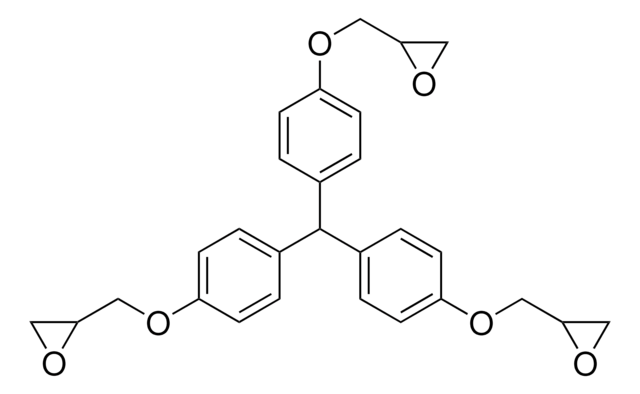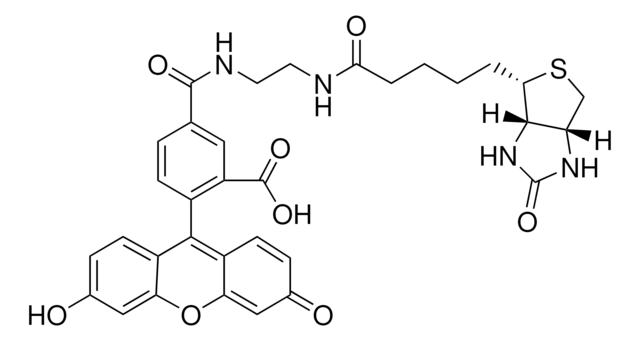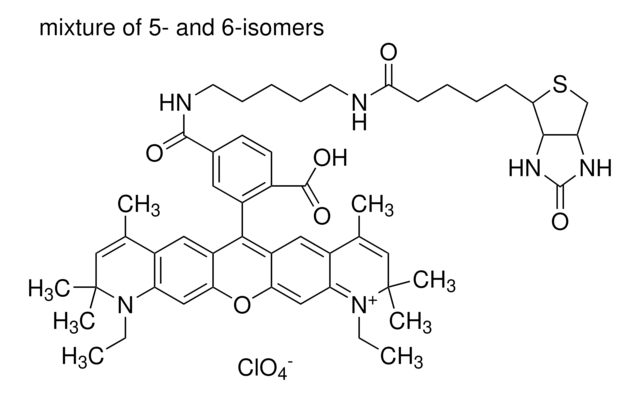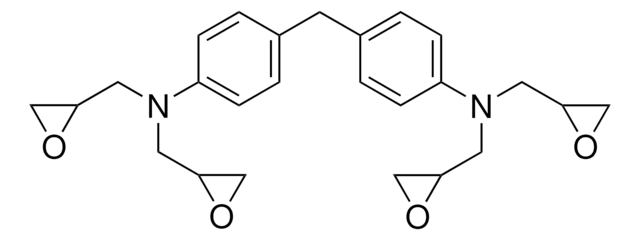Wichtige Dokumente
01632
Atto 520-Biotin
BioReagent, suitable for fluorescence, ≥90% (HPLC)
Synonym(e):
Biotin-Atto 520
About This Item
Empfohlene Produkte
Produktlinie
BioReagent
Assay
≥90% (HPLC)
Form
powder
Hersteller/Markenname
ATTO-TEC GmbH
Löslichkeit
DMF: soluble
ethanol: soluble
methanol: soluble
λ
in ethanol (with 0.1% trifluoroacetic acid)
UV-Absorption
λ: 522-528 nm Amax
Eignung
suitable for fluorescence
Lagertemp.
2-8°C
SMILES String
[O-]Cl(=O)(=O)=O.CCNc1cc2OC3=CC(=[NH+]\CC)\C(C)=CC3=C(CCC(=O)NCCCCCNC(=O)CCCCC4SCC5NC(=O)NC45)c2cc1C
[O-]Cl(=O)(=O)=O.CCNc1cc2OC3=CC(=[NH+]\CC)\C(C)=CC3=C(CCC(=O)NCCCCCNC(=O)CCCCC4SCC5NC(=O)NC45)c2cc1C
InChI
1S/C37H52N6O4S.ClHO4/c1-5-38-28-20-31-26(18-23(28)3)25(27-19-24(4)29(39-6-2)21-32(27)47-31)14-15-35(45)41-17-11-7-10-16-40-34(44)13-9-8-12-33-36-30(22-48-33)42-37(46)43-36;2-1(3,4)5/h18-21,30,33,36,38H,5-17,22H2,1-4H3,(H,40,44)(H,41,45)(H2,42,43,46);(H,2,3,4,5)/b39-29-;
InChIKey
OCYRRKMPTKPPHX-QITHAKLPSA-N
Anwendung
Rechtliche Hinweise
Lagerklassenschlüssel
11 - Combustible Solids
WGK
WGK 3
Flammpunkt (°F)
Not applicable
Flammpunkt (°C)
Not applicable
Persönliche Schutzausrüstung
Eyeshields, Gloves, type N95 (US)
Hier finden Sie alle aktuellen Versionen:
Besitzen Sie dieses Produkt bereits?
In der Dokumentenbibliothek finden Sie die Dokumentation zu den Produkten, die Sie kürzlich erworben haben.
Unser Team von Wissenschaftlern verfügt über Erfahrung in allen Forschungsbereichen einschließlich Life Science, Materialwissenschaften, chemischer Synthese, Chromatographie, Analytik und vielen mehr..
Setzen Sie sich mit dem technischen Dienst in Verbindung.







